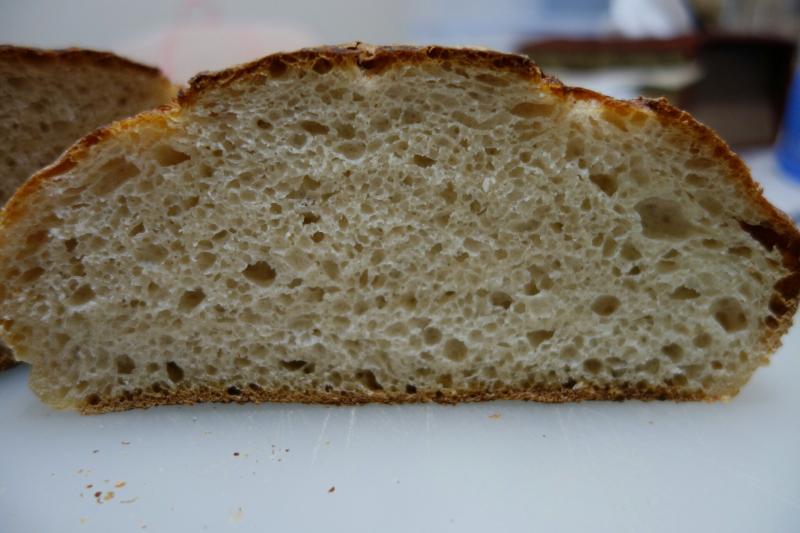
Basic Sourdough Bread using 1, 2, 3 formula



Very excited to be part of the community.
Even more excited to bake my first successful pure sourdough bread using the 1, 2, 3 formula with some changes.
I'll post more pictures later.
100g of sourdough starter (100% hydration)
177.5g of water
300g flour
6g salt
Instead of 200g water which will give a hydration of 71.4%, I lowered the hydration to 65% (confidence issue).
I started by mixing the flour and water, then kept it in the fridge overnight. (8 hours of autolyse)
Fed the white sourdough starter as well.
The next morning, I took 100g of the starter, mixed it with 180g of the flour/water mix and kept the rest in the fridge.
Brought the mix to work and observed its growth. 4 hours later, it had doubled. I was surprised by this "young" starter's rising power. (Just got it from eBay 10 days ago)
I popped it in the fridge at work to slow down the fermentation. I don't want it to be too sour, so I hoped that chilling it will slow it down.
When I got home, I mixed in the rest of the flour/water mixture and salt.
Knead 15 mins using the Bosch mixer.
The next 45 mins, I did (or tried to do) some s&f every 15 mins.
Room temperature here is 30C, so I have a shorter bulk fermentation.
Then I pre-shaped the dough, rested it for 15 mins, reshaped again into a boule and placed into my rice-floured plastic banetton.
I put it into my not-so-working wine cooler at 19C, hoping to bake the following day.
4 hours later (11pm), it almost doubled and I panicked because I planned to bake it the following day afternoon. So I placed it in the fridge (5C).
The next morning (today), I saw that the dough rose further in the fridge overnight. But I had to go to work so couldn't bake it.
I think it didn't over-proof and there was even a oven spring of about 20%. This is the best rise I got using sourdough. My previous home-grown sourdough starters have always produced bricks. So much so, my wife thinks this new sourdough starter is abnormal. :)
Baked the dough after transferring it to a cold cast iron pot and scoring.
Pre-heated oven of 240C with lid for 25 mins, 230C without lid for 15 mins.
Notes:
1) The reason why the flour and water was added in 2 separate additions is because previous tries always resulted in a dough not rising even though the starter (home grown) looked active. And after reading about increasing the strength of the starter by incremental feeds, I tried it on the main dough.
2) The bottom of the loaf is more charred than the top. Will put some cornmeal to buffer the heat next time.
3) The starter (from eBay) is too active for me. Will need to reduce it to maybe 15%.


Comments
Looks great! How was the crumb?
Just uploaded the crumb shot.
I used bosch mixer to knead for a good 15 mins. Still don't trust myself to do s&f to develop the gluten. :p
The crumb is soft, but chewy. I use 100% bread flour. Might use 50% AP next time.
The crust looks great and the crumb you got is exactly what you get when using a mixer and lowering the hydration. Have no fear! Ditch the mixer and up the hydration and your bread crumb will improve dramatically. The best way to gain confidence and skill is just do it and have no worries. Next thing you know, you will be making great SD bread the 1:2:3 way with bigger and more irregular holes in the crumb. Getting rid of some of the bread flour can wait till you have S&F skills and your confidence up - but it is a good idea. You can do it!
Happy SD baking
Thanks!
Will try again soon. Baking bread needs permission from the better half.
But at least, she is not rejecting this not-too-sour sourdough bread. I had to eat my mistakes previously, all extremely sour bricks!
then refresh a white flour starter and or levain often and many times, throwing much away. do it all at 82 F and make sure it is yurng when it goes int he dough. Do the gluten development, ferment and proof at 82 F - and don't retard it. This will give you the least amount of sour in your SD bread.
Happy baking
But I thought for more flavours (not just sour), retarding is the key?
you will be able to taste the other flavors the yeast produces and let the grain come though. I just made the post because you said you didn't want it too sour.
I use retarding to make the proof or ferment fit my schedule. A bulk 8-12 hour retard won't make the dough too sour if the rest of work is done at 82 F.
I'm always going for more sour not less though and do everything the opposite, at cold temperature as much as possible, to bring it out.
When I grow up, I wanna be like you. :p